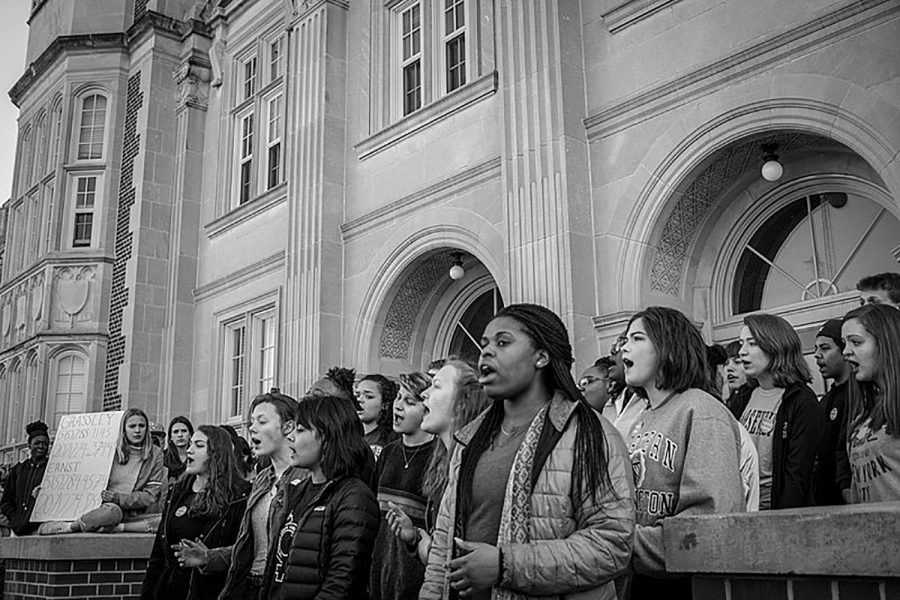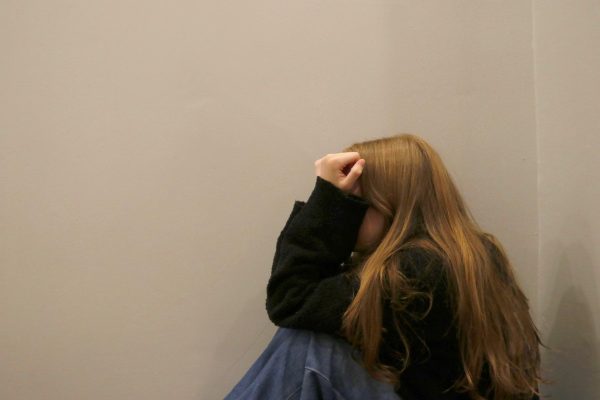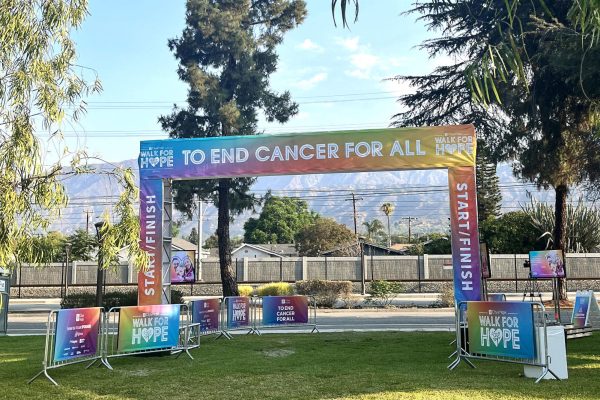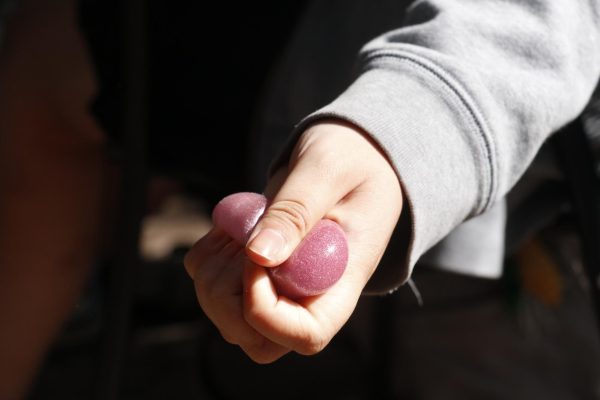Community members reflect on gun violence, gun control activism
Photo credit: "Creative Commons Students Walkout Against Gun Violence" by Phil Roeder is licensed under CC Attribution 2.0 Generic.
Students at Roosevelt High School in Des Moines, Iowa protest against gun violence after the shooting at Marjory Stoneman Douglas High School. Approximately 3 million American children witness gun violence every year.
More than one year ago, on Feb. 14, 17 students were killed by a shooter at Marjory Stoneman Douglas High School in Parkland, Florida. News of the shooting caused students around the nation and in cities worldwide, led by the Marjory Stoneman Douglas survivors, to call for gun control, putting the issue in the forefront of political debate and leading millions of students nationwide to participate in walkouts and marches advocating for gun control.
“Young people bring new ideas to the table and are more open to accepting others and are more passionate about creating a world that is better to live in,” Kylie Chryss-Connell, a sophomore member of the Los Angeles Student Activist Coalition, said. “I think that it is really important to get people who will be living in our future world involved in activism now, so by the time we are the ones in charge, the world is ready for us.”
Students across the nation participated in one of the walkouts for gun control, March for Our Lives, an organization founded by survivors of the Marjory Stoneman Douglas shooting. One of these students was Archer junior Maddie Fenster, who is also a member of the LA Student Activist Coalition and helped organize a gun control rally last year.
“I was impacted and disgusted and shocked by the lack of reaction from the president and from government, and I know that a lot of people were as well,” Fenster said. “Because it’s teenagers, it’s teachers, it’s parents, it just felt like a personal attack.”
One year after the Marjory Stoneman Douglas shooting and the March for Our Lives rally, an NPR poll found that 51% of Americans want stricter gun control laws, down from 71% of Americans in 2018.
Sophia Fink, a recent graduate who served as a senior class representative and member of Peer Support, believes the decreasing support is because shootings are “happening so often that people become desensitized.”
“There was a shooting yesterday, but I haven’t heard anyone talk about it, whereas before, two years ago, three years ago, we would have discussed it over and over again and made more safe spaces,” Fink said referring to the shooting at STEM School Highlands Ranch in Littleton, Colorado.
Sophomore history teacher Nick Graham believes that the reason America has been unable to pass little national gun control legislation is America’s “gun culture.”
“A big part of the American narrative is this idea of rugged individualism — the frontiersmen and women that harness, tame the frontier. If you listen to the politicians, [they] talk all about how this is a capitalist country in which individuals strive to make their own,” said Graham. “I think that there’s a concomitant to that which says that you strive here by yourself [and] once you’ve acquired what’s yours, you do everything you damn well can to keep a hold of it and protect it as well, so you go out and you own a gun.”
Beyond mass shootings, gun-related suicides are ten times higher in the United States than any other high-income countries such as the United Kingdom, while gun homicides are 25 times higher. Approximately 4.5 million American women alive today have been threatened with a gun by an intimate partner.
“Orlando, Las Vegas, Parkland, all of those deserve to make headlines and should make headlines and should get people screaming,” said Fenster. “But hundreds of women are killed in abusive relationships by gun violence, hundreds of young black men are shot on the streets by police officers each year and this is all gun violence. Gun violence is not [limited] to mass shootings — it’s just what gets attention because the rest of it has become so normalized that the public doesn’t see it anymore.”
According to Everytown Research, gun homicides are most prevalent in racially segregated impoverished neighborhoods, where black Americans are 10 times more likely than white Americans to die from gun violence. Firearms are the leading cause of death for black American children and teens.
“It’s really sad and really horrifying, but it’s also not super surprising because of the history of systematic oppression and the way that that has impacted communities of people of color,” sophomore Hannah Joe said.
Graham explained why he thinks communities with high rates of poverty also have high rates of gun violence.
“People are almost entrapped in social economic misery, and it’s no surprise that out of that misery becomes rage at one’s perceived entrapment… [that] will inevitably sort of spill over into physical violence,” Graham said. “Now, guns are so easily acquired in this country… it’s no surprise that they find their way into that neighborhood where like I said some people are encouraged to prey on each other.”
According to Kristine Louie from the National Center for Child Traumatic Stress, those impacted by gun violence often are affected physiologically with reactions such as fears of another shooting, grief and post-traumatic stress reactions. Post-traumatic stress reactions include recall of images of experience, avoidance of anything that reminds them of the shooting, withdrawal reactions where they feel detached from others and physical arousal reactions such as difficulty sleeping or concentrating. For some, these reactions can develop into depression, anxiety or post-traumatic stress disorder.
According to Louie, after attacks, it is important for children to feel a sense of security.
“Restoring a sense of safety is an important component in promoting recovery,” Louie said. “In communities that experience gun violence frequently, children may not experience a sense of safety and can feel under constant threat.”
Twelve states, including Alaska, Arizona and Kansas, currently allow individuals to carry a concealed weapon in public without a permit; none of these states have altered the gun laws after the previous mass shootings including the Marjory Stoneman Douglas High School incident.
“It worries me just how many guns are out there and how easy it is for people to get them,” Fink said. “We’re not really talking about changing gun laws…that’s the scariest thing — that these mistakes have been made and we’re still not fixing them.”

Chloe Richards joined the Oracle as a Staff Writer in the 2018. She is on the Varsity Tennis Team at Archer, is in the Upper School Choir and participates...








